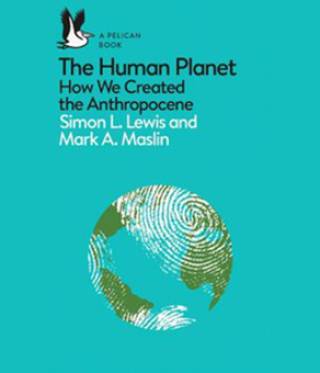A remarkable exploration of the science, history and politics of the Anthropocene, one of the most important scientific ideas of our time, from two world-renowned experts
Meteorites, methane, mega-volcanoes and now human beings; the old forces of nature that transformed Earth many millions of years ago are joined by another: us. Our actions have driven Earth into a new geological epoch, the Anthropocene. For the first time in our home planet's 4.5 billion-year history, a single species is dictating Earth's future.
To some, the Anthropocene symbolises a future of superlative control of our environment. To others, it is the height of hubris, the illusion of our mastery over nature. Whatever your view, just below the surface of this odd-sounding scientific word, the Anthropocene, is a heady mix of science, philosophy, religion and politics linked to our deepest fears and utopian visions.
Tracing our environmental impact through time to reveal when humans began to dominate Earth, scientists Simon Lewis and Mark Maslin masterfully show what the new epoch means for all of us.
Selected as one of The Observer's best books of 2018
Review
A careful explanation of what society is doing to this amazing planet and its people. I was absolutely gripped. Brilliantly written and genuinely one of the most important books I have ever read (Ellie Mae O’Hagan)
Profound and thought-provoking, this book does a remarkable job explaining where the current proposal to define a new human-dominated era properly fits (Thomas E. Lovejoy, winner of the Blue Planet Prize)
The book’s main story—how one species, Homo sapiens, fresh off the trees of Africa, came to rule the Earth so completely that it now stands a good chance of wrecking it—has the force of a Greek tragedy (Prof. Christoph Irmscher in The Wall Street Journal)
Understanding what it means for humans to have become a geological force reshaping the workings of the Earth is both a deep intellectual challenge and a political necessity. Richly thought through and provocative from its title onwards, The Human Planet rises to that challenge, bringing together Earth's history and human history in a new way. Its reassessment of the past will equip its readers to understand the future -- and perhaps to improve it (Oliver Morton, author of The Planet Remade)
.... into this congested and contested territory that Simon L. Lewis and Mark A. Maslin step to offer a clear, intelligent and engaged history of an argument about the Anthropocene. Lewis and Maslin also argue that the point of defining the Anthropocene is political as much as it is scientific, the aim being to change futurity and thereby avoid Earth system collapse. (Robert J. Mayhew in The Times Higher Education)
Today scientists increasingly believe that we have entered a new era, the Anthropocene. In this succinct but sweeping re-evaluation of the human story, Simon Lewis and Mark Maslin show exactly why this abstract-sounding contention should radically affect our views of today and tomorrow. The Human Planet packs more ideas into a small space than I would have thought possible (Charles C. Mann, author of The Wizard and the Prophet)
That humans now dominate the 'natural' systems of our planet is the key fact of our time--this book does a remarkable job of explaining how that came to pass, and why it matters so much (Bill McKibben, author Falter: Has the Human Game Begun to Play Itself Out?)
In The Human Planet, geographer Simon Lewis and geologist Mark Maslin provide a compelling narrative, stretching from the emergence of hominins ... to our position today, as a species with planetary reach. Explaining the many ways in which we are now profoundly altering Earth, from polar melt to deforestation, they provide convincing evidence that we should indeed dub our new epoch the Anthropocene. The Human Planet is immensely readable and introduces important concepts. (Prof. Wolfgang Lucht, Nature 7/6/2018)
 Close
Close


